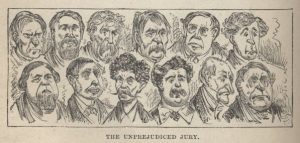The right to a jury trial in criminal cases is guaranteed by the Sixth Amendment to the U.S. Constitution and by Article I, Section 16 of the California Constitution. Implicit in the requirement of a jury is the idea that the jurors will exercise unbiased and intelligent judgments. Empaneling such a jury is a challenge.
Last week, Governor Jerry Brown signed into law legislation, AB 1541 (Kalra) which rewrites Section 223 of the California Code of Civil Procedure regarding the selection of jurors in criminal trials. AB 1451 prohibits the court from imposing specific unreasonable or arbitrary time limits or establishing an inflexible time limit policy for voir dire. The bill also requires the court in a criminal trial to permit liberal and probing examination during jury selection for the purpose of discovering bias or prejudice with regard to the circumstances of the particular case or the parties before the court.
What would Calvin H. Higbie say about AB 1541?
The bill reminded me of the following passage from Samuel L. Clemens' Roughing It:
I remember one of those sorrowful farces, in Virginia [City, Nevada], which we call a jury trial. A noted desperado killed Mr. B., a good citizen, in the most wanton and cold-blooded way. Of course the papers were full of it, and all men capable of reading, read about it. And of course all men not deaf and dumb and idiotic, talked about it. A jury-list was made out, and Mr. B. L., a prominent banker and a valued citizen, was questioned precisely as he would have been questioned in any court in America:
"Have you heard of this homicide?"
"Yes."
"Have you held conversations upon the subject?"
"Yes."
"Have you formed or expressed opinions about it?"
"Yes."
"Have you read the newspaper accounts of it?"
"Yes."
"We do not want you."
A minister, intelligent, esteemed, and greatly respected; a merchant of high character and known probity; a mining superintendent of intelligence and unblemished reputation; a quartz mill owner of excellent standing, were all questioned in the same way, and all set aside. Each said the public talk and the newspaper reports had not so biased his mind but that sworn testimony would overthrow his previously formed opinions and enable him to render a verdict without prejudice and in accordance with the facts. But of course such men could not be trusted with the case. Ignoramuses alone could mete out unsullied justice.
When the peremptory challenges were all exhausted, a jury of twelve men was impaneled--a jury who swore they had neither heard, read, talked about nor expressed an opinion concerning a murder which the very cattle in the corrals, the Indians in the sage-brush and the stones in the streets were cognizant of! It was a jury composed of two desperadoes, two low beer-house politicians, three bar-keepers, two ranchmen who could not read, and three dull, stupid, human donkeys! It actually came out afterward, that one of these latter thought that incest and arson were the same thing.
. . . The jury system puts a ban upon intelligence and honesty, and a premium upon ignorance, stupidity and perjury. It is a shame that we must continue to use a worthless system because it was good a thousand years ago. In this age, when a gentleman of high social standing, intelligence and probity, swears that testimony given under solemn oath will outweigh, with him, street talk and newspaper reports based upon mere hearsay, he is worth a hundred jurymen who will swear to their own ignorance and stupidity, and justice would be far safer in his hands than in theirs.
"The unprejudiced jury" from the 1872 edition of Roughing It (American Publishing Co.). The front matter states that the book is "fully illustrated by eminent artists" and "issued by subscription only, not for sale in book stores". Curiously, the publisher doesn't mention Amazon.





